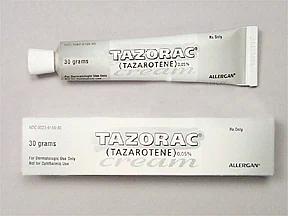Tazorac Disease Interactions
There are 2 disease interactions with Tazorac (tazarotene topical).
Retinoid/retinoid-like topical (applies to Tazorac) eczema
Major Potential Hazard, High plausibility.
Topical retinoids may cause severe irritation on eczematous skin. Therapy with topical retinoids should be avoided on abraded or eczematous skin.
References (3)
- (2001) "Product Information. Retin-A (tretinoin)." Ortho McNeil Pharmaceutical
- (2001) "Product Information. Differin (adapalene topical)." Galderma Laboratories Inc
- (2001) "Product Information. Tazorac (tazarotene topical)." Allergan Inc
Retinoid/retinoid-like topical (applies to Tazorac) sunburn
Moderate Potential Hazard, High plausibility.
Retinoid-like products can cause extreme irritation when applied to sunburned skin. Patients with sunburn should be cautioned not to use retinoid-like acne products until fully recovered, and to avoid prolonged exposure to sunlight (including sunlamps) and use sunscreen/protective clothing during treatment with these products.
References (4)
- Rosenbluth M (1989) "Adverse reaction to retin-A." J Am Dent Assoc, 119, p. 346
- (2001) "Product Information. Retin-A (tretinoin)." Ortho McNeil Pharmaceutical
- (2001) "Product Information. Differin (adapalene topical)." Galderma Laboratories Inc
- (2001) "Product Information. Tazorac (tazarotene topical)." Allergan Inc
Switch to consumer interaction data
Tazorac drug interactions
There are 12 drug interactions with Tazorac (tazarotene topical).
More about Tazorac (tazarotene topical)
- Tazorac consumer information
- Check interactions
- Compare alternatives
- Pricing & coupons
- Reviews (38)
- Drug images
- Side effects
- Dosage information
- Patient tips
- During pregnancy
- Generic availability
- Drug class: topical acne agents
- Breastfeeding
- En español
Related treatment guides
Drug Interaction Classification
| Highly clinically significant. Avoid combinations; the risk of the interaction outweighs the benefit. | |
| Moderately clinically significant. Usually avoid combinations; use it only under special circumstances. | |
| Minimally clinically significant. Minimize risk; assess risk and consider an alternative drug, take steps to circumvent the interaction risk and/or institute a monitoring plan. | |
| No interaction information available. |
See also:
Further information
Always consult your healthcare provider to ensure the information displayed on this page applies to your personal circumstances.


